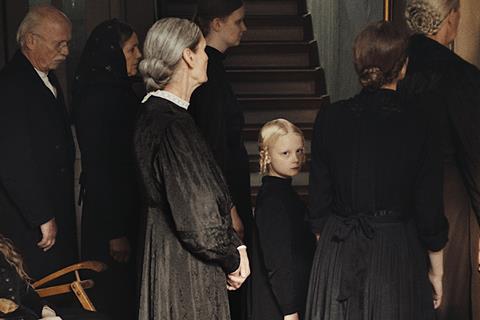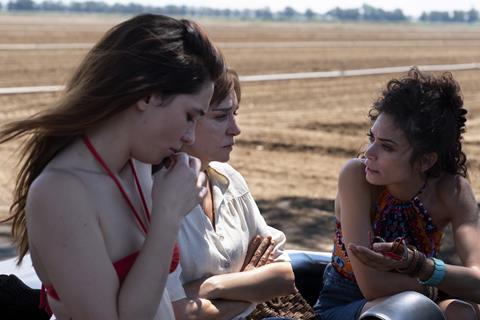![[Clockwise from top left] Enrique Gonzalez Kuhn, Stefan Schmitz, Laura Perez Camiña, Enrique Costa, Adolfo Blanco](https://d1nslcd7m2225b.cloudfront.net/Pictures/480xany/6/2/0/1450620_clockwisefromtopleftenriquegonzalezkuhnstefanschmitzlauraperezcaminaenriquecostaadolfoblanco_804557.jpg)
It is a competitive business acquiring films for Spain at Cannes. Spanish rights for many of the Competition titles have already been secured ahead of the festival by savvy buyers who have kept an eye on the film or filmmaker for years and by companies that boarded the project at script stage through their production arms.
Companies are increasingly co-buying to share the risk. For example, Elastica Films and Wanda Vision co-distributed Emilia Pérez in Spain. Along with Elastica’s The Substance, the two were the most successful Cannes 2024 titles at the Spanish box office.
Now the race is on for Spain’s acquisitions executives to fill their slates with films debuting in the sidebars and the enticing packages in the market.
Adolfo Blanco - CEO, A Contracorriente Films
How many films are you planning to acquire?
Normally about three or four, but it’s hard to tell. The great thing about Cannes is you can get a finished film that has been selected at the festival, one that will go to Venice, a more mainstream one that won’t necessarily premiere at a big festival, or a buy after reading the synopsis of a project.
Which films are you most excited to see?
I need to keep my cards close to the chest. Competition in Spain is hard. A lot of the films in the festival’s selection have been bought so we will naturally shift towards market titles.
We have always had very productive talks with Gaumont in Cannes and Olivier Nakache and Eric Toledano’s new project, Just An Illusion, will be at the market so we have our eye on it. We have handled all their films since 2012’s Untouchable. We release around 12 French films a year.
When do you close the deals? During the market, before or after?
A bit of everything. One of the titles selected in Cannes Premiere, Fatih Akin’s Amrum [sold by Beta Cinema], we acquired in Berlin.
What is shaping your acquisitions strategy?
For theatrical, I don’t think the problem is the number of films being released because they are all very different. The problem is when a clearly commercial film underperforms. This is happening in Spain.
We released Gilles de Maistre’s family film Moon The Panda and it underperformed. It made 90% less in the first weekend compared to Mia And The White Lion six years ago, by the same director, same type of film. This means we have to think carefully about our choices.
And what is changing for buyers?
Despite the complications, more and more films are being bought. There are more small distribution companies that don’t aim so much at theatrical but at finding a streaming slot, so small films have a chance that they didn’t get before.
Enrique Costa - Head of distribution and co-founder, Elastica Films

How many films are you planning to acquire?
We already have Romería by Carla Simon that we also produced, and four other films in Competition: Sentimental Value by Joachim Trier; The Secret Agent by Kleber Mendonca Filho, which we are co-distributing with La Aventura; Mascha Schilinski’s Sound Of Falling; and Nouvelle Vague by Richard Linklater. And also The Love That Remains by Hlynur Palmason in Cannes Premiere. We will get other films but we don’t have a number in mind.
What are you most excited to see?
We look for good stories but we also take into account the filmmaker, the cast, the producers and the sales company. We also check what’s in the interest of Elastica-type of distribution companies internationally.
When do you normally close the deals?
When you are after a film, you start showing interest well in advance. In the case of Emilia Pérez, I remember meeting Jacques Audiard years ago and hearing him talk about it. I was hooked and kept my radar on to find the right moment to get the film.
We also had our eye on The Substance but we had to wait to see if it was going to be handled by a sales company, not distributed by a studio, to go ahead. You do your homework but success is not necessarily a given. Nobody has a magic formula of what will work or not.
What is shaping your acquisition strategy right now?
There are a lot of distribution companies in Spain and it’s one of the countries in Europe with more releases per week, so pressure is high. You have to know exactly what is best to get and how to handle it.
What has changed the most about buying in Cannes?
How competitive it is — I miss being able to pause before making decisions.
Enrique Gonzalez Kuhn - CEO, Caramel Films

How many films are you planning to acquire?
We have four films already: Alpha by Julia Ducournau in Competition, and A Private Life by Rebecca Zlotowski and The Richest Woman In The World by Thierry Klifa, both playing Out of Competition. These three we will distribute jointly in Spain with Youplanet Pictures. And we will also handle Raoul Peck’s Orwell: 2+2=5 in Cannes Premiere with Filmin.
Which films are you most excited to see?
It’s exciting to discover first features, you always hope to get an Aftersun-type of film. And I can’t wait to see the films in Competition. We bought Lynne Ramsay’s YouWere Never Really Here at Cannes in 2017 and I’m looking forward to seeing Die, My Love.
When do you normally close the deals?
After the pandemic most films are pre-sold before the festival starts so you have to look for them well in advance to have a chance and get them before any prize doubles the price. We got Alpha last year at the market, for example.
What is shaping your acquisitions strategy?
With the many releases we have in Spain each week, you ideally need well-known filmmakers, a well-known cast and a strong budget. Cannes films are among the best placed.
How has the market changed for you?
We all agree there are a lot of distribution companies in Spain now, and that we tend to go for the same films. That, combined with the situation of theatrical exhibition in the country, makes it quite challenging. There are a number of films that work really well but many that don’t work at all. The mid-range films that could make around €150,000 [$170,000] have virtually vanished.
Lara Perez Camiña - Co-founder and partner, BTeam Pictures

How many films are you planning to acquire?
Two or three European films. We also distribute a lot of Spanish cinema. We are distributing many of the Spanish productions selected by Cannes: Oliver Laxe’s Sirat, Guillermo Galoe’s Sleepless City, that we co-produced, as well as The Mysterious Gaze Of The Flamingo by Diego Cespedes, a Chile-Spain co-production. Beyond Spanish cinema, we have already bought Tarik Saleh’s Competition title Eagles Of The Republic.
What are you most excited to see?
We would like to get some titles by filmmakers with whom we have already worked. The official selection is always interesting, but it’s pretty much sold out already.
When do you close the deals?
The earlier you get them, the better the price deal. But it also means you take risks in what might or might not end up selected by Cannes. We bought Eagles Of The Republic last year at the Berlinale, looking at the screenplay.
What is shaping your acquisitions strategy?
Shared acquisitions between two distributors help minimise risks. It also helps cope with high prices. We handled Sofia Coppola’s Priscilla with Elastica Films and are going to do it again for Ruben Östlund’s The Entertainment System Is Down.
What has changed in the market?
There has been a shift in the audience that we have to take into account. Our films used to draw mostly adults, women in particular. Now it feels more heterogeneous and younger. This means you have more of a sense of cinema linked to the idea of event, and here awards play a key role. Films like Anora and Emilia Pérez are good examples.
Stefan Schmitz - CEO, Avalon

How many films are you looking forward to acquiring?
A good Cannes for us — between pre-bought films and films bought at the market — is when we get three or four, sometimes even five. Cannes, together with the Oscars, are the key platforms for films.
Which films are you most excited to see?
There are very few films in Competition that are available. In terms of what I’m excited to see, I would point out Mario Martone’s Fuori and Jafar Panahi’s It Was Just An Accident, and I always like checking sidebar sections.
Last year we got Miguel Gomes’s Grand Tour, Andrea Arnold’s Bird and Paul Schrader’s Oh, Canada, which were all in Competition, but also Armand by Halfdan Ullmann Tondel, that premiered in Un Certain Regard as well as Ernest Cole, Lost And Found by Raoul Peck, in Special Screenings.
What is shaping your acquisitions strategy?
After Aki Kaurismaki’s Fallen Leaves, we hit a bump and Cannes films like Grand Tour, Bird and Oh, Canada underperformed. I think the type of independent films now working best in Spain are the ones with big awards, that are either radical, to attract younger audiences, or borderline mainstream.
What has changed in the market from your point of view?
That the films that look most promising have become expensive, with crazy bidding wars. Interestingly, I think it coincided with [the arrival of ] companies like A24.

























No comments yet